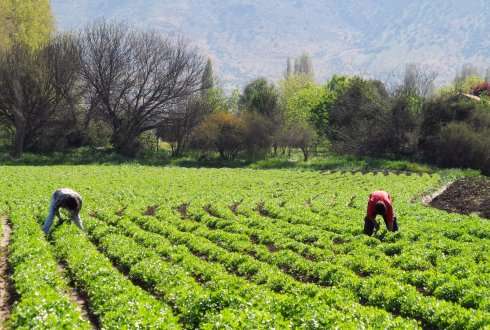Innovation in Chilean vegetable and flower sector

It all began with a question from Wageningen UR Chile, the South American branch of Wageningen UR: "Is there expertise in the Netherlands to assist Chilean vegetable growers in modernising their businesses?" A three-year innovation programme led by Frank Wijnands is set to be launched soon in response.
"Vegetables in Chile are mostly grown on small farms," Wijnands says about the current situation. "About seventy per cent of the farms are smaller than twelve hectares. The average age of farmers is high and their income is low." The Chilean ministerial task force INDAP therefore invests in the professionalisation of production and marketing, and approached Wageningen UR Chile for help.
They quickly had Wijnands' attention. In the Netherlands, he had been working on professional networks for 25 years and, together with other scientists, developed a successful approach for co-innovation. The idea of setting up a similar approach in Valparaiso, Chile, seemed an exciting challenge.
"The project is about technical innovation for more sustainable and profitable crops, but definitely also about improved cooperation between farms to achieve better market access and better collaboration with suppliers and processors. These are more process-based innovations, which Wageningen UR is particularly good at."
Boosting innovation and cooperation
The innovation programme has two tracks. "In the first track, we invest in innovation of the operations on the farms and in cooperation. We will start working with forty vegetable and flower growers who wish to boost innovation and cooperation in the region. "The idea is that, together with Chilean universities and business advisors, we guide them in building their market and in the organisation of partnerships with other entrepreneurs. The small farmers now mostly sell their products to intermediaries, who resell them in the large trading market Lo Valledor in Santiago. Shortening the chains through improved cooperation and maintaining control of the relationship with the end customer is another goal of our programme with INDAP."

Training agricultural advisors
The second track focuses on the training of agricultural advisors. "They are all generalists who know a little bit of everything but lack in-depth knowledge in specific areas. Training advisors to become specialists, for example in pesticides, fertilisers or business operations, but also in guiding groups and emerging innovations, is necessary in order to properly guide growers in the coming years as they become modern entrepreneurs.
"This is something on which we and INDAP totally agree. We will set up the training with our Chilean partners and make use of the vast experience that Wageningen UR's Centre for Development Innovation (CDI) has built up around the world."
Good prospects
Wijnands expects a lot from this co-innovation approach. "In Chile, the approach can deliver even more results than in the Netherlands since there is more to gain in terms of yield improvement and in-out efficiency. Producers in Chile still barely work together to learn from each other, and the gap between research and practice is that much greater. A lot of knowledge is never properly deployed. We aim at an improved flow to the end users." Other regions in Chile are watching with considerable interest to see what the Wageningen approach will bring.
If you are also interested in setting up an international co-innovation project, get in touch with Frank Wijnands.
Provided by Wageningen University



















